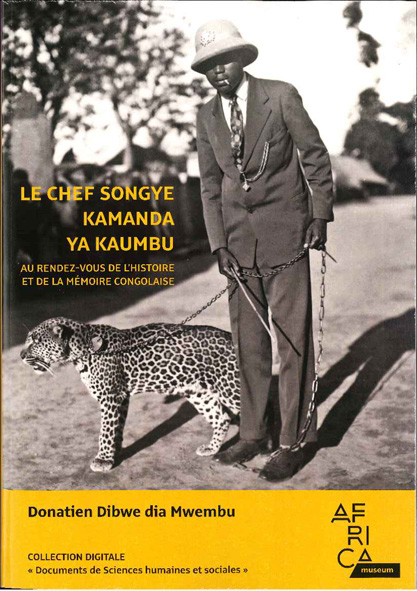RMCA publications
Le Chef songye Kamanda ya Kaumbu au rendez-vous de l’histoire et de la mémoire congolaise
La biographie de Kamanda ya Kaumbu que Donatien Dibwe dia Mwembu met à la disposition du public est une excellente œuvre d'histoire. Ce chef constituait un obstacle commun aux objectifs de trois forces dont les intérêts étaient divergents. Les Luba du Kasaï voulaient se débarrasser, à travers le grand chef Kamanda, de l'hégémonie songye, c'est-à-dire, avec l'aide des colonisateurs, les égaler ou alors les dominer à leur tour. Les Ben'Eki et les Belande, propriétaires fonciers du territoire de Kabinda, voulaient se défaire de Kamanda et de la domination des étrangers bekalebwe en vue de recouvrer leur autonomie, mettre un terme à cette société pyramidale et revenir ainsi à la société songye acéphale d'avant l'avènement de Lumpungu. Les Belges voulaient écarter du pouvoir Kamanda dont les idées contagieuses et dangereuses d'indépendance risquaient de perturber l'ordre public et de compromettre l'avenir de la colonie.
La vie de Kamanda est donc au carrefour de l'histoire nationale, de celle du peuple des Songye et de celle de la colonie belge.
L'édition originale de cet ouvrage est parue en 2007 aux Presses universitaires de Lubumbashi (RDC).
***
De grote Songye chef Kamanda ya Kaumbu is een personage wiens geschiedenis nog steeds zeer omstreden is. Hij zou onopgemerkt zijn gebleven in de algemene geschiedenis van Congo en vooral in het Congolese geheugen, als de vrouw Kapinga wa Tshiyamba zijn leven niet had doorkruist. Hij werd immers door het koloniaal bestuur ter dood veroordeeld omdat hij Kapinga had vermoord en opgegeten en haar dochter, een mulattin tussen twee en drie jaar oud, had vermoord.
Donatien Dibwe dia Mwembu's biografie van Kamanda ya Kaumbu is een uitstekend stuk geschiedenis. Deze chef vormde een gemeenschappelijk obstakel voor de doelstellingen van drie krachtbronnen met uiteenlopende belangen. De Luba van de Kasaï wilden zich, via de grote chef Kamanda, ontdoen van de Songye hegemonie, d.w.z. met de hulp van de kolonisatoren, hen evenaren of op hun beurt overheersen. De Ben'Eki en de Belande, landeigenaren van het Kabinda-gebied, wilden zich ontdoen van Kamanda en van de overheersing van de Bekalebwe vreemdelingen. Op die manier zouden ze hun autonomie terugwinnen, een einde maken aan deze piramidale samenleving en zo terugkeren naar de Songye maatschappij zonder leider van vóór de komst van Lumpungu. De Belgen wilden Kamanda de macht ontnemen, omdat zijn aanstekelijke en gevaarlijke onafhankelijkheidsideeën de openbare orde dreigden te verstoren en de toekomst van de kolonie in gevaar brachten.
Het leven van Kamanda bevindt zich dus op het kruispunt van de nationale geschiedenis, de geschiedenis van het Songye volk en de geschiedenis van de Belgische kolonie.
De originele uitgave van dit boek werd gepubliceerd in 2007 door de Presses universitaires de Lubumbashi (DRC).
***
The great Songye chief Kamanda ya Kaumbu remains a highly controversial figure to this day. He would have long been forgotten in the general history of Congo and fallen from Congolese memory were it not for a woman named Kapinga wa Tshiyamba in his life. Kamanda was sentenced to death by the colonial authorities for murdering and eating Kapinga and killing her biracial daughter, then around two or three years old.
The biography of Kamanda ya Kaumbu now offered to readers by Donatien Dibwe dia Mwembu is an excellent work of history. Three groups with divergent interests had one thing in common: the chief was a hindrance to their ambitions. The Luba of Kasai wanted to dismantle Songye hegemony – personified by the great chief Kamanda – with the help of the colonisers, and rival them in power if not dominate them in turn. The Ben'Eki and the Belande, who owned land in the territory of Kabinda, wanted to get rid of Kamanda and by extension the domination of the Bekalebwe outsiders. In doing so, they would regain their independence, put an end to the pyramidal social structure, and return to the headless Songye society that existed before Lumpungu came to power. Belgian wanted to remove Kamanda from power, as his dangerously contagious views about independence risked disrupting public order and compromising the future of the colony.
The life of Kamanda thus sits at the crossroads of the history of the nation, the Songye people, and the Belgian colony.
The original edition of this book was published in 2007 by the Presses universitaires de Lubumbashi (DRC).
 Freely available at this link
Freely available at this link